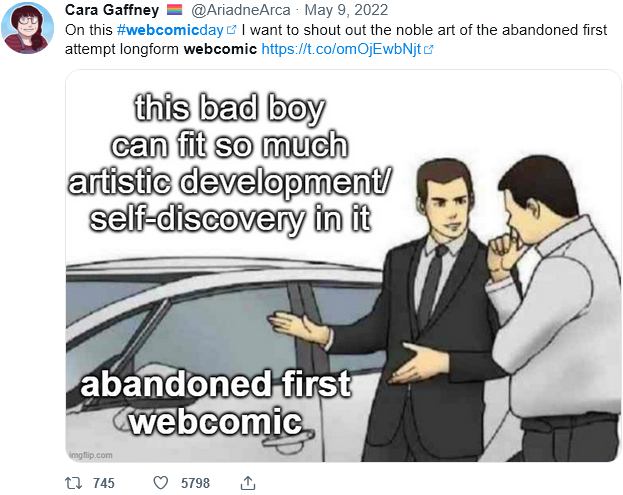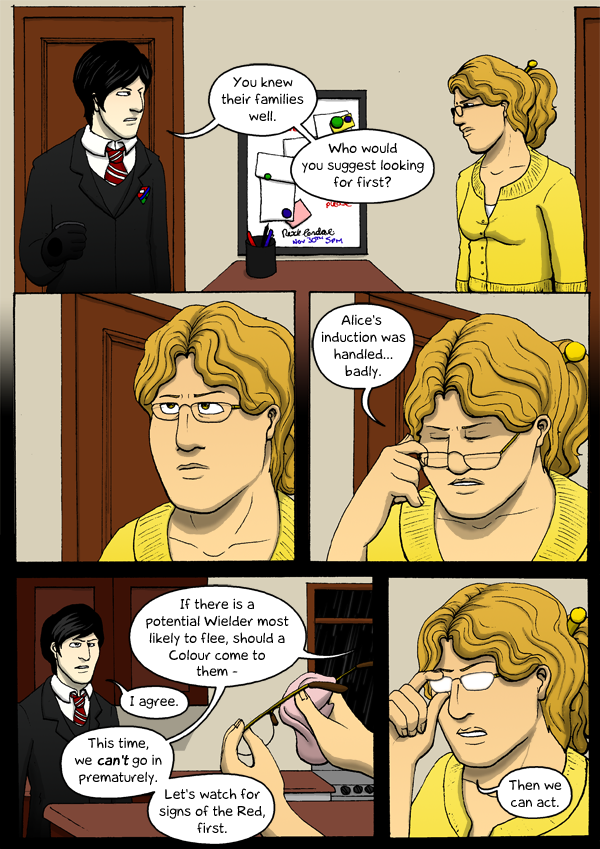In Defence Of the Noble Tradition of Abandoning Webcomics
On Webcomic Day in May 2022, before Twitter became X and mutated into what it now is, I had a tweet go viral.

It had been a thought that had been stewing for some time, but I absolutely did not expect it to strike the chord that it did. All in all, it was probably the nicest possible viral experience anyone could have hoped for: nobody was rude, and nobody aggressively misconstrued my point. There was one guy claiming that abandoning a webcomic is “bad business”, which I got into a four-reply altercation with, until I realised I was arguing with a talking point I’d last seen in 2008 and abruptly came to my senses. All in all, a very reasonable outcome.
Most importantly, I had dozens upon dozens of people in my mentions suddenly talking about their long-forgotten projects. And sure, some of them talked with shame, but most of them spoke with nostalgia - even fondness. However they’d once felt about their suspended projects, it was clear that these were not some source of shame or resentment.
And that’s how it should be. For those of you who may have some lingering shame linked to an unfinished comic - or those of you who are holding off on starting one because of the fear of failure - I’m here to hopefully to convince you otherwise.
My abandoned webcomics history
The Selkie Awards, the new Scottish comics award which I launched last year, would not exist if it were not for two abandoned webcomics.
The first was my own, a decade ago. I posted the thirty-fourth page on 22 March 2012, which would have been a month and a bit before my third year university exams, and then never posted another.
What caused me to stop working? No one thing in particular. There were the exams, obviously, but I was also dwelling on worldbuilding plot holes that I wasn’t sure how to resolve. There was also that Tesco that I was supposed to draw in the very next sequential page, a sticking point that I didn’t have the wherewithal to push past. I also just didn’t feel like continuing, which is honestly underrated as a reason to stop doing something.
But at the end of the day, I learned a few important things:
Firstly: webcomics really worked for me as a way of creating comics! The posting schedule, the audience expectations and reactions, all of it. (That’s not universal - sometimes what you learn from your webcomic is that you don’t want to do webcomics. That’s valuable information, too.)
Secondly: I learned some tricks to optimise the way I work. It turns out that I work best when I’m working on about five pages at once - that way, I can harness my own tendency to procrastinate by letting myself swap between pages every time I get a little bored or frustrated, until finally one is within a stone’s throw of completion, and I can focus on getting it there.
Lastly: I learned all the tiny things you learn by creating 34 pages of comic, by drawing the things you need to draw to tell the story you’re envisaging. I experimented with caves. I read tutorials for how to depict raindrops on windows. I wrestled with depth. I learned how to leave myself enough space for speech bubbles, again and again and again.
(Okay, admittedly, I re-learn that last one all the time. I get over-excited, all right! I forget. That’s what the Transform tool is for.)

The second abandoned webcomic was a friend’s, which started three years later. I looked it out while writing this article, and was so glad to find it still existed out there (though I’m not sure they’d thank me for sharing it; their work is now fantastic, but back then was merely excellent). Reading it back instantly catapults me back ten years, reminding me of the excitement I felt as I read each new page - the character interactions, the setting, the politics.
It was inspiring. It reminded me what I loved about comics so much.
It meant that when I got an idea, a few months later - not even an original idea, it was for a Steven Universe fancomic - instead of going “that’s silly, find something else”, my brain went “So what? You love comics. You want to make one. You don’t have any other ideas that are ready to go. Why not do this one?”
And so I did - a decision that led me to the Scottish convention circuit, and to the Selkies.
It’s capitalism, again
Honestly, I think the idea that if you start anything, you have an obligation (to yourself or to others) to finish it, is both 1) heavily based in our capitalist Productivity Is Worth society, and 2) totally unrealistic and counter to how learning to do a thing actually works.
To learn any skill you need to do experiments, trial runs, failed attempts, abridged efforts. It’s a necessary part of the process that nobody gets to skip.
“How to write a long-form work” is a skill. And that means it’s subject to the same rules as any other kinds of learning: there’s stuff you’ll only figure out by making the attempt, and not every attempt will be successful.
That’s not something to be ashamed of. That’s just life.
Shrödinger’s career path
One of the cool but also double-edged-sword aspects about the internet is that it’s provided a place to publish work that otherwise would have remained unseen in a sketchbook somewhere.
Illustrators are more motivated than ever to share their works in progress, even recording themselves as they draw to demonstrate the process. Many prose writers, too, participate in their own public proving ground, an area where experiments can be made, where stories can be posted while still works-in-progress, which also is notorious for being littered with half-finished tales: I’m talking, of course, about fanfiction.
We should be more aware than ever that the creative process is one of starts and stops. And yet, the concept of the abandoned webcomic still casts a shadow over so much advice to new creators, in a way that sketches and unfinished fanfics don’t. Keep it small. Don’t jump straight into a huge project. Be realistic.
One big difference is that fanfiction is understood to be a hobby, and sketching is understood to be practice. Webcomics are usually a hobby; however, they could - if you’re lucky - turn into something more. The best webcomics can easily stand shoulder-to-shoulder with what the big traditional comics publishers can put out, and it’s that sliver of potential that changes the stakes, bringing with it additional expectations, additional pressure. To abandon a webcomic is not just to close the door on a specific hobby project: it can feel like failing your professional journey somehow.
And yet, countless professional comic artists started out in just this way.
Whenever a professional comic creator tells their fans, “Don’t be like me - don’t start with a huge project, start with something you can finish”, I want to cry out, but look how far you made it! Didn’t the work you did on that unfinished project play a part? You say, “start with something you can finish”, but if you managed to make it this far without following that advice, can it really be so vital?
It’s not that I think that it’s incorrect to have regrets about the way you started your career. It’s totally reasonable to look back on years of work into an unfinished project and wish you hadn’t spent as much time on it, or gone about it more sensibly.
But I do think it’s a shame, especially if you are still in comics; especially if you are making money from comics, a position that too few people are in. I think it’s worth considering reframing things away from “I didn’t finish it, therefore it was a failure”. The efforts you made, the people you met, the things you learned - all of these things are worth something. You don’t need to feel bad that it didn’t pan out. You can still be proud of the attempt.
No advice here, just comics
I don’t want to finish this blog by laying out any broad-brush advice for new creators. Everyone is motivated in different ways, everyone has different goals. Finding out what drives you is such a personal thing, and so much of comics can only be discovered by diving in.
I just want to push back on the ever-present admonition to new creators to focus on what is realistic above all else; to work small; to focus all your energy on finding a way to the finish line.
After all, there’s a very good chance that your favourite creators didn’t follow that advice themselves. And, well, they’re your favourites for a reason.